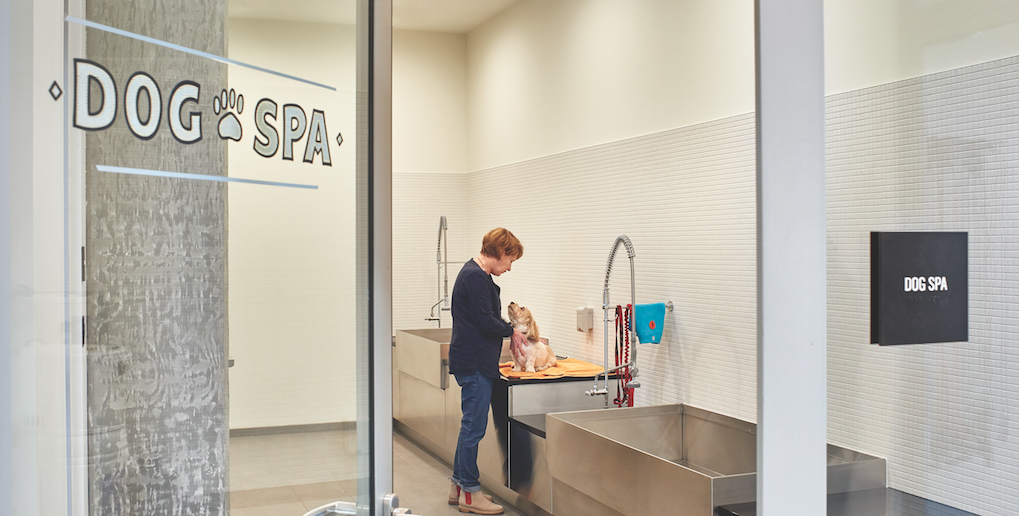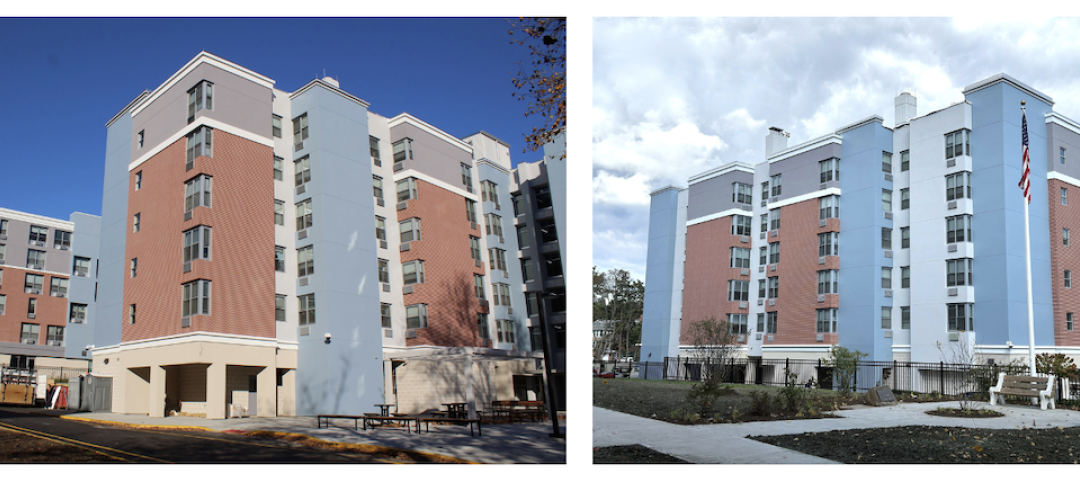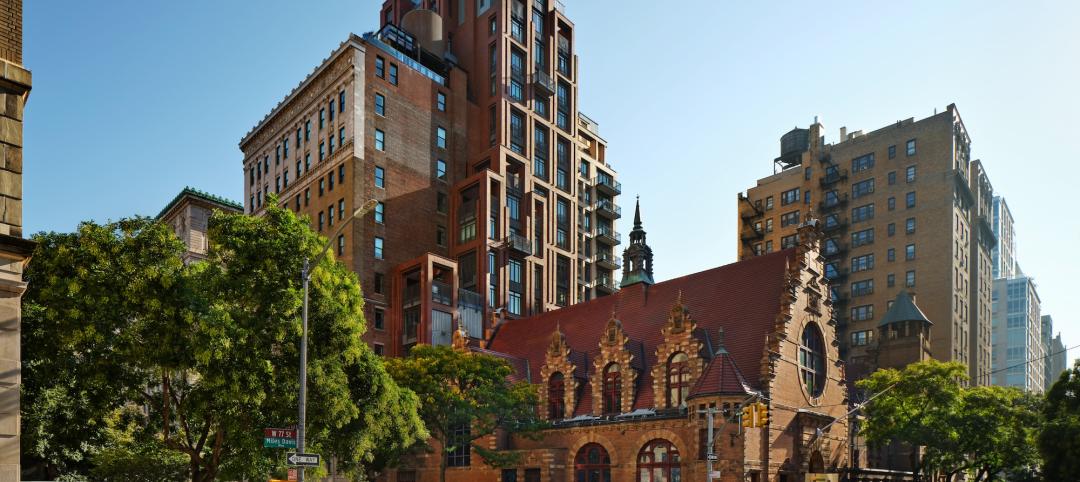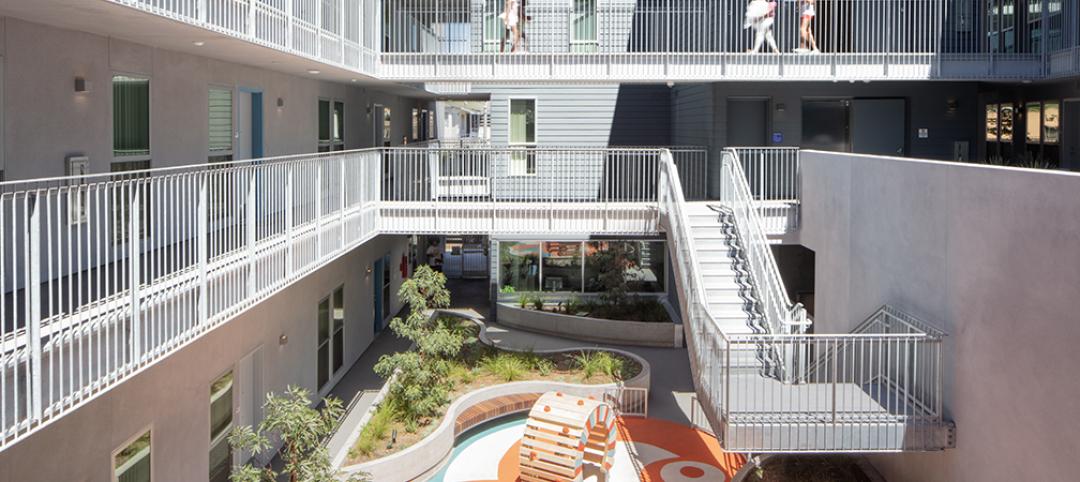There’s a construction boomlet under way in dog-washing facilities at U.S. and Canadian apartment and condominium communities.
Half of U.S. dog owners live in the 25 largest U.S. metro areas, where dog-focused amenities are common at apartment and condominium properties. More than half (55.2%) of respondents to this publication’s 2017 “Amenities Survey” said they had installed a dog-wash spa in a multifamily project.
Dog ownership has risen 29% in the past decade, claims pet-food market researcher Packaged Facts. According to the American Veterinary Medical Association, singles and renters make up the fastest-growing group of new dog owners.
Dog-washing stations provide renters and condo owners with an on-site amenity that’s a lot more practical than bathing a pup in a ceramic or fiberglass tub intended for humans. “Most tubs in multifamily building units have a conventional kitchen sink drain that can easily clog with dog fur, leading to maintenance and hygiene issues,” said Gary Sherman, Founder/CEO, Evolution Dog Wash Company, Los Angeles, who has installed about 50 such systems in residential buildings in North America.
The cost of installing a dog wash station can run from $3,500 to $8,000 per tub with all equipment, said Dan Hembree, President, Hemcor Construction, Cary, N.C. Some multifamily communities offer it as a free amenity; others charge a one-time fee or a per-use or monthly fee.
We asked four experienced professionals about installing these amenities. Here’s what they recommended.
Select a convenient location. Our experts recommend locating the dog-wash stations close to elevators, with easy access to the exterior, if possible.
The dog spa at the 41-story Quartz at City Place condominium tower in downtown Toronto is adjacent to a small outside dog park, which is accessible through a side entrance. “Residents can whisk their muddy dogs inside quickly and without tracking them through the main lobby area,” said Dominic De Freitas, ARIDO, IDC, NCIDQ, Vice President of Residential Development at interior design firm figure3, Toronto.
Size it right. Dog-washing spaces range in size from 100 sf to more than 1,000. The most basic house a utility sink and a few prefabricated stainless-steel tubs, said architect Brian Romanelli, Associate, Solomon Cordwell Buenz, Chicago. Larger, more sophisticated dog spas feature custom-designed systems with wall-mounted blow dryers and grooming tables. Rooms should be adequately sized to give dog owners easy access to all equipment, he said.
Connect the space to other pet amenities. At AMLI Residential’s new AMLI Arc luxury apartment tower in downtown Seattle—a city where pets far outnumber children—the “Canine Social Club” in the 12th-floor amenities space has a dog spa with two self-serve washing areas and a grooming station with a hydraulic lift. The space is adjacent to an indoor-outdoor pet lounge that’s connected to a semi-outdoor dog run with artificial turf.
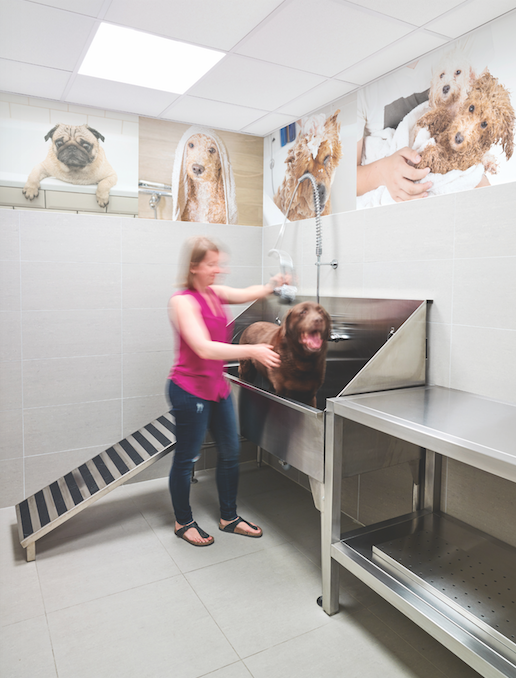
The dog-washing station at the Quartz Condos at Concord CityPlace in Toronto. Photo: Steve Tsai
“We were able to create a large, playful space that benefits both the residents and their pet family members,” said Camilla Watson, Interior Designer, ZGF Architects, Seattle.
Where there are multiple tubs, position the water valves on opposite sides of the tubs, so that two dogs aren’t facing each other while bathing. “Helps avoid conflict,” said Hembree.
Provide a ramp for the dogs, especially larger species, to get into the tub. “It can be a strain to hoist and control a rambunctious pup who isn’t crazy about getting wet and soapy,” said Sherman.
Never ignore aesthetics. Developers want to avoid making dog-grooming spaces feel like utilitarian, back-of-house facilities, said De Freitas. “There’s more of a focus to create a spa-like environment, especially in purpose-built rental projects,” he said.
At the Sinclair, a 35-story, 390-unit luxury apartment tower in Chicago’s Gold Coast neighborhood, the finishes in the dog spa are consistent with the project’s other amenity spaces. “Tile floors, wainscoted walls, custom decorative lighting, and natural-toned finishes were incorporated throughout the space” as requested by the developer (Fifield Companies), said Romanelli.
Pay close attention to maintenance, air quality, and noise. Select wall and floor finishes that are easy to clean and resistant to moisture, including slip-resistant floors with a dog-friendly coating, said Romanelli. “It’s also important to provide adequate ventilation to ensure that no strong odors leave the room.” Sound-absorbing ceiling tiles and other acoustical treatments can prevent boisterous barks from penetrating into adjacent spaces.
Make sure electrical outlets are designed to accommodate hair dryers—in some cases, a 220-volt receptacle may be needed. Install wall-mounted hair dryers within easy reach of human users. If necessary to avoid accessibility problems, have the manufacturer weld custom brackets underneath the grooming table, said Hembree.
Specify non-slip grooming mats on drying tables. “A good rubber mat allows the wet animal to stand comfortably without fear of slipping,” said Hembree.
Look into built-in storage. The dog spa at AMLI Arc has open bins for residents to store their supplies short-term and lockers for long-term storage, said Watson.
Build community. Pet owners gravitate toward other pet owners, and dog-washing stations can serve as social connectors in multifamily communities. “We’re seeing a big push to create a community-like environment within a building,” said De Freitas. “As these spaces continue to get larger, they’re inevitably going to become more social as well.”
At a new apartment building De Freitas is designing in downtown Toronto, the glass-fronted dog-wash room will be clearly visible from the main lobby. “We want the lobby to feel active and conducive to community,” he said. “So many people in these buildings have dogs. We’re trying to celebrate that, instead of hiding it.”
Prepare for future enhancements. De Freitas predicts that professional dog-grooming services, such as nail trimming and shearing, will become more common as developers and property managers test new and more elaborate pooch-friendly services.
Related Stories
Adaptive Reuse | Mar 21, 2024
Massachusetts launches program to spur office-to-residential conversions statewide
Massachusetts Gov. Maura Healey recently launched a program to help cities across the state identify underused office buildings that are best suited for residential conversions.
Multifamily Housing | Mar 19, 2024
Jim Chapman Construction Group completes its second college town BTR community
JCCG's 200-unit Cottages at Lexington, in Athens, Ga., is fully leased.
Multifamily Housing | Mar 19, 2024
Two senior housing properties renovated with 608 replacement windows
Renovation of the two properties, with 200 apartments for seniors, was financed through a special public/private arrangement.
MFPRO+ New Projects | Mar 18, 2024
Luxury apartments in New York restore and renovate a century-old residential building
COOKFOX Architects has completed a luxury apartment building at 378 West End Avenue in New York City. The project restored and renovated the original residence built in 1915, while extending a new structure east on West 78th Street.
Multifamily Housing | Mar 18, 2024
YWCA building in Boston’s Back Bay converted into 210 affordable rental apartments
Renovation of YWCA at 140 Clarendon Street will serve 111 previously unhoused families and individuals.
Adaptive Reuse | Mar 15, 2024
San Francisco voters approve tax break for office-to-residential conversions
San Francisco voters recently approved a ballot measure to offer tax breaks to developers who convert commercial buildings to residential use. The tax break applies to conversions of up to 5 million sf of commercial space through 2030.
Apartments | Mar 13, 2024
A landscaped canyon runs through this luxury apartment development in Denver
Set to open in April, One River North is a 16-story, 187-unit luxury apartment building with private, open-air terraces located in Denver’s RiNo arts district. Biophilic design plays a central role throughout the building, allowing residents to connect with nature and providing a distinctive living experience.
Affordable Housing | Mar 12, 2024
An all-electric affordable housing project in Southern California offers 48 apartments plus community spaces
In Santa Monica, Calif., Brunson Terrace is an all-electric, 100% affordable housing project that’s over eight times more energy efficient than similar buildings, according to architect Brooks + Scarpa. Located across the street from Santa Monica College, the net zero building has been certified LEED Platinum.
MFPRO+ News | Mar 12, 2024
Multifamily housing starts and permitting activity drop 10% year-over-year
The past year saw over 1.4 million new homes added to the national housing inventory. Despite the 4% growth in units, both the number of new homes under construction and the number of permits dropped year-over-year.


